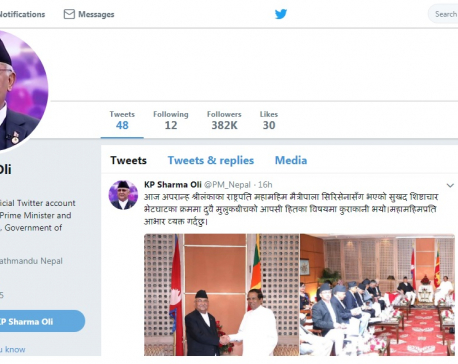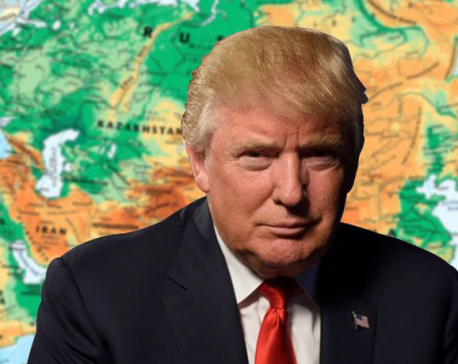
OR
Bill allows govt to shut down unregistered social media sites
Published On: January 6, 2020 07:58 AM NPT By: Republica | @RepublicaNepal

KATHMANDU, Jan 6: A bill, which is on the verge of endorsement by the lower house of parliament, may pave the way for the government to shut down social media sites at any time and under any pretext, according to experts.
The Information Technology Bill, which was approved by a parliamentary committee last month and is awaiting endorsement by the House has proposed that the government can ban the social media sites that are not registered with the Nepali authorities.
Section 91 of the bill has provisioned that all domestic and foreign social media companies operating in Nepal should get registered in Nepal within a period specified by the government. “All social media companies which are operating in the country prior to the commencement of this law should be registered at the (Information and Technology) department within a given period,” reads Section 91 (2) of the bill.
Subsequent section of the bill further reads that the “government shall ban the use of social media which is not registered in the country.”
Stakeholders fear that the provision of the bill could pave the way for the government to shut down social networking sites in the country under any pretext and this will infringe upon the freedom of expression.
“[Foreign] Social media companies will indeed come to register with us, because they have been doing business here. We have not imagined that they would not come,” said Minister for Communication and Information Technology Gokul Baskota.
Once the bill becomes a law, the government may ask social media companies including Youtube, Facebook, Twitter, Viber, Whatsapp, Instagram and Tiktok among others to register themselves with the Information Technology Department.
But stakeholders say top social media companies are unlikely to register in Nepal given the small size of the market here.
Asked what the government would do if the companies did not register themselves in Nepal, the minister replied, “Who knows what will happen if the sky falls.”
Section 92 of the bill states that “the department can order a social media operator (company) to immediately remove or censor any social media post that is offensive under the law.” This provision allows the government to direct social media companies like Facebook, Twitter and Youtube among others to remove social media posts of certain individuals without securing a court order.
“The bill allows the government to ban social media sites just like the porn sites,” said former president of the Federation of Nepali Journalists Tara Nath Dahal. “It also paves the way for the government to curtail the freedom of expression of citizens through hefty fines and jail sentences.”
Interestingly, the bill has also not defined what is a social media site allowing the government to define the term to its liking.
The IT bill has proposed up to five years jail and Rs 1.5 million fine for anyone publishing offensive social media posts including mocking at someone, engaging in pranks or threatening someone.
“We fear that the government may misuse this provision to close down social media sites in Nepal. Because I don’t see much possibility of foreign social media companies coming to Nepal for registration in the current situation,” said Anil Ghimire, a tech blogger known as Aakarpost. “The companies will decide about it after a profit analysis. If they don’t find it profitable they may not come.”
You May Like This

Government reaching out to people through social networking sites
KATHMANDU, Sept 2: Following the government's decision to use the social networking sites to make dialogue with people effective and... Read More...

Trump signs $1 trillion spending bill, keeps government open
BRANCHBURG, N.J. (AP) — President Donald Trump signed his first piece of major legislation on Friday, a $1 trillion spending... Read More...

'Labor Bill, Social Security Bill crucial to improve laborer-employer relation'
KATHMANDU, May 1: Industrialists and trade union leaders are hopeful that the endorsement of Labor Bill and Social Security Bill by... Read More...






Just In
- Challenges Confronting the New Coalition
- NRB introduces cautiously flexible measures to address ongoing slowdown in various economic sectors
- Forced Covid-19 cremations: is it too late for redemption?
- NRB to provide collateral-free loans to foreign employment seekers
- NEB to publish Grade 12 results next week
- Body handover begins; Relatives remain dissatisfied with insurance, compensation amount
- NC defers its plan to join Koshi govt
- NRB to review microfinance loan interest rate











Leave A Comment